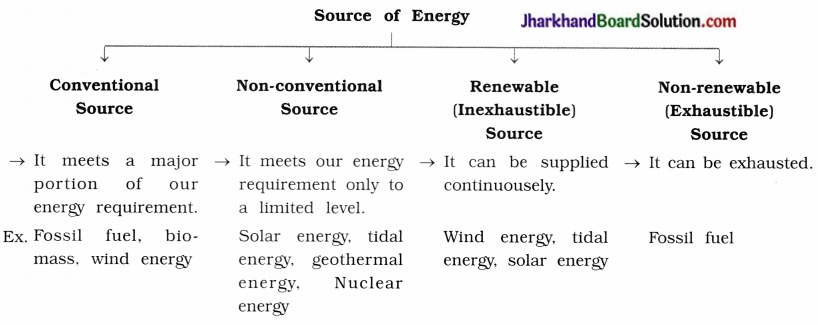Students must go through these JAC Class 10 Science Notes Chapter 14 Sources of Energy to get a clear insight into all the important concepts.
JAC Board Class 10 Science Notes Chapter 14 Sources of Energy
→ Energy can neither be created nor destroyed.
→ Energy is the capacity of a system to perform work.
→ Source of energy: The source which can provide energy conveniently is called source of energy.
→ A good source of energy : A source should be easily accessible, easy to store and transport and able to do large amount of work.

→ Fossil fuel : Coal, petroleum products and natural gas, etc. are fossil fuels.
→ The growing demand for energy is largely met by fossil fuels which are non-renewable sources of energy.
→ The thermal power plants produce heat energy from fuels and converts it into electrical energy.
![]()
→ A quarter of energy requirement in India is met by Hydropower plants.
→ Biomass : The matter obtained from living organisms is called biomass.
→ Fire wood, cow-dung cake. etc. form fuels which are plant and animal products. These sources are called biomass, which are traditionally used as fuels.
→ Charcoal: When wood is burnt in a limited supply of oxygen charcol is left behind as the residue.
→ Biogas: It is produced by decomposition of cow-dung, agriculture wastes, vegetable waste and sewage in absence of oxygen.
- Biogas is an excellent fuel as it contains upto 75 % methane.
- Biogas plant provides fuel gas as well as manure.
→ Wind energy: The kinetic energy of the wind can be used to get electricity on a commercial scale. Wind energy is an environment friendly and efficient source of renewable energy.
→ Solar energy: Solar energy is the root of all energy.
- India receives solar energy for greater part of the year.
- Solar cooker, solar water heater, solar cell panel, etc. are widely used now-a-days.
→ Ocean energy : Tidal energy, wave energy and ocean thermal energy are considered as ocean energy.
- Due to high and low tides, the difference in sea level gives tidal energy.
- Wave energy would be a viable proposition only where waves are very strong.
- Temperature difference between the water at the surface and water at depths is exploited to obtain ocean thermal energy.
→ Geothermal energy : Heat energy can be exploited from the steam trapped in rocks near the hot springs. This is called geothermal energy.
![]()
→ Nuclear energy: It is obtained by nuclear reactions, i.e.,
- Nuclear fission – The fission of an atom of uranium.
- Nuclear fusion – Joining of lighter nuclei (hydrogen isotopes) to create a heavier nucleus (helium).
→ CNG (Compressed Natural Gas) : CNG is considered as the cleaner alternative to petrol or diesel.
→ Renewable energy is available in our natural environment, in the form of repetitive current of energy.